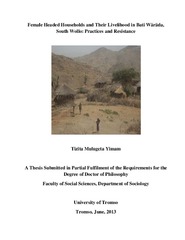Female Headed Households and Their Livelihood in Bati Wäräda, South Wollo: Practices and Resistance
Permanent link
https://hdl.handle.net/10037/5871Date
2014-02-13Type
Doctoral thesisDoktorgradsavhandling
Author
Yimam, Tizita MulugetaAbstract
This thesis is conducted in Northern Ethiopia, Bati woreda. It explores how the existing gender relation in Bati woreda plays a role on livelihood of female headed households. Qualitative method that include semi structure interview, focus group discussion, key informant interview and observations are the main data collection instruments. Twenty female headed households that compromised of widow, divorcee and separated are the main focus of the sturdy. The thesis used the sociologist Pierre Bourdieu theory of practice as the main theoretical framework, his important concepts like habitus, field and capital are used to analyze the livelihood of female headed households and their attempt to diversity their livelihood and get social capital. The livelihood framework developed by DFID has also used as a means to prepare the interview guide and structure the analysis.
The thesis found that the way female headed households are formed play a significant role in influencing female headed household livelihood. Habitus and capitals are also found as play important concept to help to clearly understand how gender relation in the woreda function. The study has also shown that the presence and / or absence of capital play a significant role in influencing livelihood of female headed households and enabling female household heads to resist and negotiate their household livelihood.
Publisher
Universitetet i TromsøUniversity of Tromsø
Metadata
Show full item recordCollections
Copyright 2014 The Author(s)
The following license file are associated with this item:


 English
English norsk
norsk
